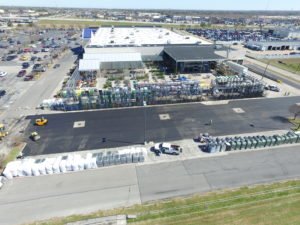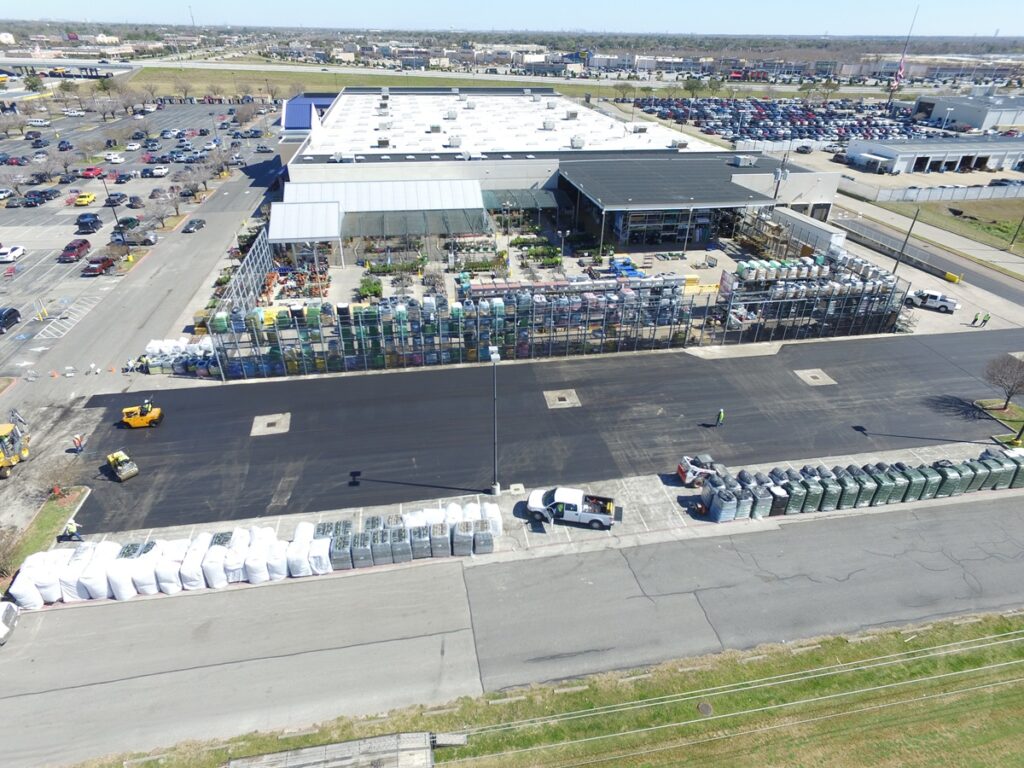
Many things are important when installing asphalt pavement, but one of the most critical steps is the quality of the compaction. Although the theory of compaction is relatively simple, the actual implementation is quite complicated and something that only experienced, reputable contractors understand and practice properly. Without adequate compaction, asphalt pavement can fail prematurely, often requiring complete removal and replacement.
Asphalt Paving: Compaction & Implementation
The Purpose of Compaction
To compact something is to make it dense, tightly packed, firm or compressed. Compaction reduces the volume of the item, but it also makes the item stronger and more uniform. When asphalt pavement is compacted, the process helps the particles knit together to improve stability and resistance to rutting while making the pavement less permeable. As a result, the pavement will be smoother and more durable.
Compacting the Subgrade
It is essential that the subgrade be prepared properly to avoid structural failure of the pavement. The soil must not have any soft spots, and it must be thoroughly compacted and contoured to match the shape of the finished pavement. If the soil has soft spots or is otherwise unsuitable, it may be necessary to replace it with good soil or aggregate material that can be compacted properly.
Compacting the Asphalt
Asphalt contractors can use a variety of mixtures to install pavement. The asphalt as well as the aggregate used can be different grades and types. Each mix can require different compaction strategies. Furthermore, the thickness of the asphalt layer can require adjustments to the compaction methods; thin layers cool faster, making compaction more difficult as asphalt needs to be compacted while it is still hot. Thicker layers also require heavier rollers or more of them to ensure that the asphalt is properly compacted.
If Compaction Is Improper
Asphalt contractors must ensure that the pavement and subgrade are compacted properly, as a variety of flaws can appear in the pavement in a relatively brief period. Alligator cracking, a damage pattern of interconnected cracks resembling the scales on a crocodile’s back, can occur if the subgrade lacks the strength required to support the weight of traffic. Longitudinal cracks are those that are parallel to the centerline of the pavement; improperly compacted joints can sometimes cause these cracks. Ruts in the pavement are often the result of inadequate compaction when the asphalt was installed.
Repairing asphalt pavement that has been improperly compacted can require the complete replacement of the pavement, but if the area affected is small and the damage is superficial, it may be possible to fill or patch the area. Even if the damage appears minor, however, it should be repaired promptly. If cracks are left open to the elements, water may penetrate to the foundation and destabilize it. Once the foundation has been destabilized, the only solution is to remove the pavement and repair the foundation.
How to Ensure Proper Compaction
The best way to ensure that your asphalt pavement and subgrade are properly compacted is to choose a reputable, experienced contractor. Ask for references; call them to inquire about the quality of the contractor’s work. If possible, visit some of these locations to see the results for yourself. Make sure that the contractor has the staffing and equipment needed for the scope of your project.
If you prefer to save time and effort when choosing an asphalt contractor, call Alpha Paving Industries in Austin, Tx. We are a full-service, highly rated, award-winning asphalt company providing an extensive range of services in Austin and throughout Central Texas. We offer asphalt paving and overlays, parking lot striping, asphalt repairs, milling, sealcoating, concrete work and other paving-related services. Whether you need a road constructed, street maintenance or a parking lot repaired or built, we can help. Our customers include major retail chains, municipalities, airports, apartment complexes, educational facilities, subdivisions, manufacturers, health care facilities and office complexes. We offer free quotes; simply submit the online form or call (512) 677-9001.




